 |
| Child Soldiers in Nepal |
|
|
|
|
|
|
|
|
| Ten Years On, Machel Review Cites Continued Abuse Against Children in Conflicts |
NEW YORK, 17 October 2007
Dozens of conflicts around the world are still robbing children of their childhood, according to a new UN report that reviews progress since the groundbreaking 1996 study on children in armed conflict by Ms. Graça Machel.
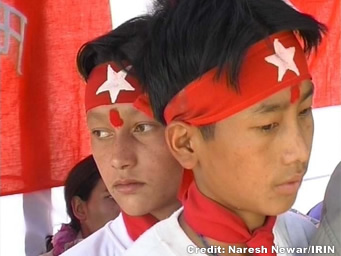 |
|
"The international community has been very active in developing a solid legal protection framework," said Ms. Radhika Coomaraswamy, Special Representative of the UN Secretary General for Children and Armed Conflict. "But much more must be done to ensure compliance, to fight impunity and to address all violations against children."
Over the past decade, conflict has impacted children more brutally than ever. They are victims of strikes against schools and of abductions aimed at forcing them to serve as combatants, sex slaves or servants. And in conflict zones their vulnerability is often greatly increased because violence claims their first line of defense - their parents.
"Threats to children caught in conflict are increasing," said UNICEF Executive Director Ann M. Veneman. "They are no longer just caught in the crossfire. They are increasingly the intended targets of violence, abuse and exploitation, victims of myriad armed groups that prey on civilians."
But the damage that war wreaks on children's lives is not limited to attacks by combatants. Malnutrition, disease, displacement and poverty also threaten them.
The report urges all UN member states to fulfill their responsibilities to children, by providing them with access to basic services like education, health, nutrition, water and sanitation. "The needs of children must be prioritized before, during and after conflict. They must be part of all peace-making and peace-building processes," said Ms. Coomaraswamy
Other key recommendations include a call to end impunity for those responsible for heinous crimes against children. This means ensuring prosecution of war crimes and adherence to relevant international norms, many of which have been established since the original Machel study was published.
Ten years ago the original landmark Machel study alerted the world to the brutal realities faced by children recruited by armed groups and on the use of sexual violence as a weapon of war.
them and aiding their reintegration into society. Concerted This new report notes progress in preventing the recruitment of children as well as in demobilizing international action has also led to advancements in combating sexual violence.
Some important achievements in this regard are the first prosecutions by international tribunals, the commitment of the Security Council to monitor and address the issues and the adoption of new international laws and standards. These include Optional Protocol of the Convention of the Rights of the Child on the Involvement of Children in Armed Conflict and the Paris Principles to prevent the unlawful recruitment and use of children.
However helping children recover from the trauma caused by their experiences and ensuring their long term reintegration into their communities remains a considerable challenge.
This follow-up strategic review offers concrete recommendations for the next decade, including a call for member states and civil society to safeguard children living in the more-than-50 conflict zones around the world, as well as those struggling in post-conflict settings.
| Source: Office of the Special Representative of the Secretary-General for Children and Armed Conflict, October 2007 |
| "Will you listen?" - Young voices from conflict zones |
NEW YORK, 18 December 2007
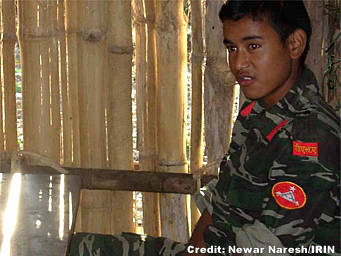 |
|
This Companion to the 10 year Machel Strategic Review compiles the views and recommendations of some 1,700 children and young people in 92 countries. Their thoughts and ideas were collected as a key contribution to the Review through a series of focus group discussions and an online questionnaire.
Focus group discussions were conducted by UNICEF, UNFPA and NGO partners in 18 countries, and involved approximately 1385 participants in 125 focus groups.The discussions were conducted in countries recently or currently affected by armed conflict. The online survey received 385 responses from a total of 92 different countries, a majority of which (78%) were from developing countries.
The focus group discussions included children and young people who have experienced conflict themselves, with many of the participants speaking about how their own lives have been affected. Facilitators tried to ensure a safe environment, to use the local language where appropriate and to create a certain 'comfort participants despite the unique challenges in each country.
For example, participants in Rwanda requested to submit their answers in writing, as they felt talking about their experiences in a group setting would open up many wounds. A focus group discussion in Somalia was held through a radio show in which more than 140 children and young people called in to talk about their experiences.
The following pages present a wide range of voices, concerns and demands captured by these discussions and online surveys. For more details and background on the survey that lead to this companion report, please visit www.unicef.org/voy
This report was compiled and edited by Vidar Ekehaug from the Global Youth Action Network (GYAN) and Chernor Bah, Special Youth Fellow at UNFPA. Special thanks go to Mima Perisic, Naseem Awl and the Division of Communication from UNICEF, Cécile Mazzacurati and David Del Vecchio from UNFPA, Susan Nicolai from the
Machel Review Secretariat, Jenny Perlman Robinson from the Women's Children, and all the GYAN team.
We are displaced children.
We are children who have been used by armed groups.
We are orphans.
We are street children.
We are girls who sell our bodies to survive.
We are children who have to work
We are children who can't go to school.
We are children with disabilities.
We are children living with HIV.
We are detained children.
We are girls who have been raped.
We are children taking care of our brothers and sisters.
We are children without a childhood.
"We have all lost a part of our life, and it will never come back." ? Young man, 18, Burundi
We are from Afghanistan, Angola, Burundi, the Central African Republic, Colombia, Haiti, Iraq, Kosovo (Serbia), Liberia, Nepal, the Occupied Palestinian Territory, the Philippines, Rwanda, Sierra Leone, Somalia, Sri Lanka, Sudan, Uganda and many other countries.
We won't tell you our names because it could be dangerous
We all have one thing in common: Our lives have been affected by armed conflict. That is why, even though we come from different places and our problems are not always the same, we speak with one voice.
We have not given up all hope yet. We still want to go to school and play with our friends. We want to help build peace in our societies and make this world a better place. We still have big dreams.
For some of us, getting together for the sake of this report gave us a rare opportunity to sit with our friends and share our stories. It has also been an opportunity to finally tell you what we feel and think.
But talking is not enough. Will we see any change after you meet to talk about us? Will you hear our voices and act on what we tell you?
We have tremendous energy and a strong will to fight for our futures. Many of us are already taking action. Will you join us?
| "Will you listen?" - Young voices from conflict zones |
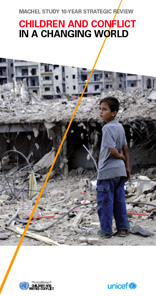 |
|
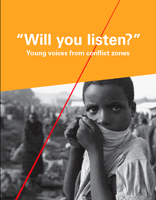 |
| Source: Office of the Special Representative of the Secretary-General for Children and Armed Conflict, December 2007 |
| Office
of the Special Representative of the Secretary-General for Children and
Armed Conflict |
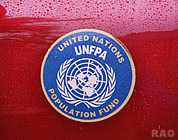 |
UN |
 |
|
|
|
|

